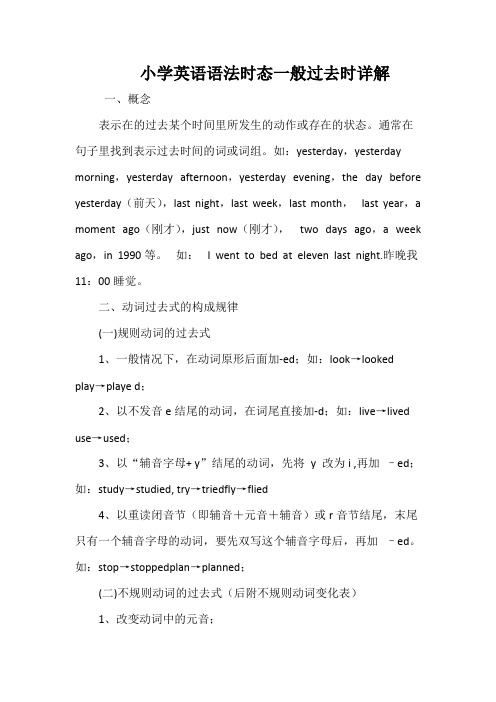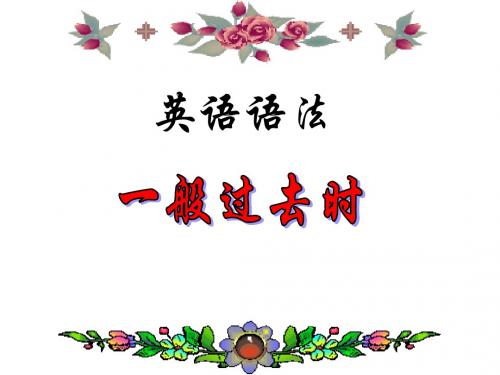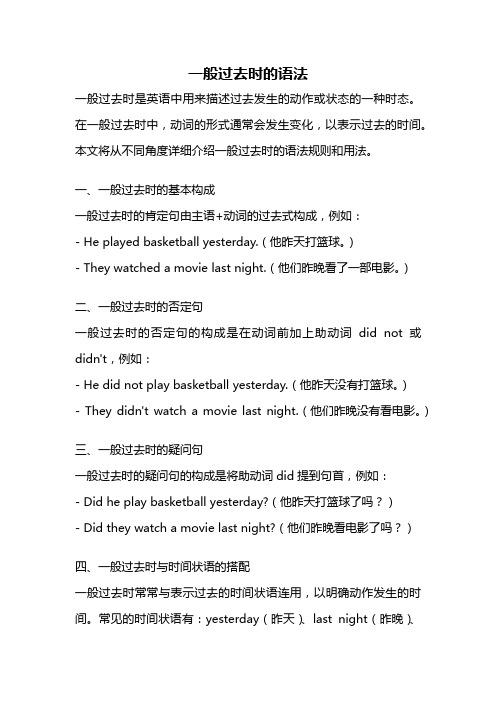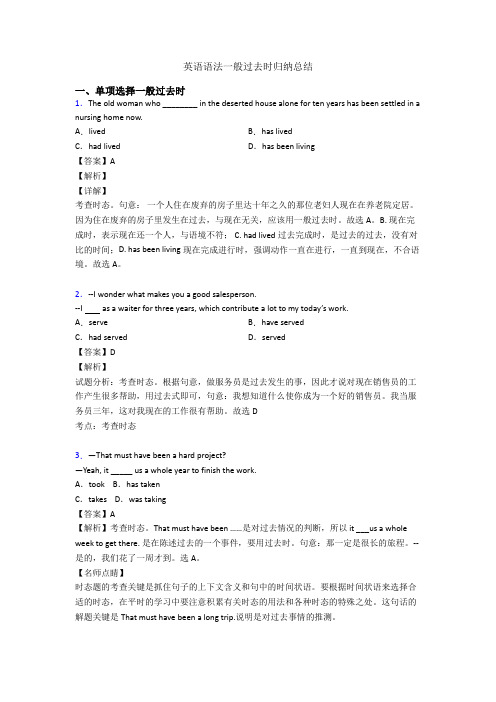英语语法一般过去时
(完整)小学英语语法时态一般过去时详解

小学英语语法时态一般过去时详解一、概念表示在的过去某个时间里所发生的动作或存在的状态。
通常在句子里找到表示过去时间的词或词组。
如:yesterday,yesterday morning,yesterday afternoon,yesterday evening,the day before yesterday(前天),last night,last week,last month,last year,a moment ago(刚才),just now(刚才),two days ago,a week ago,in 1990等。
如:I went to bed at eleven last night.昨晚我11:00睡觉。
二、动词过去式的构成规律(一)规则动词的过去式1、一般情况下,在动词原形后面加-ed;如:look→looked play→playe d;2、以不发音e结尾的动词,在词尾直接加-d;如:live→lived use→used;3、以“辅音字母+ y”结尾的动词,先将y 改为i ,再加–ed;如:study→studied, try→triedfly→flied4、以重读闭音节(即辅音+元音+辅音)或r音节结尾,末尾只有一个辅音字母的动词,要先双写这个辅音字母后,再加–ed。
如:stop→stoppedplan→planned;(二)不规则动词的过去式(后附不规则动词变化表)1、改变动词中的元音;begin→began drink→drank come→came eat→ate grow→grew run→ran know→knew win→wonspeak→spoketake→took write→wrote get→got2、变词尾的–d 为–t ;build→built lend→lent send→sent spend→spent bend→bent3、与动词原形一样;cut→cut put→put cost→cost hurt→hurt shut→shut4、变-ay 为-aid (少数动词);say→said pay→paid lay→laid5、采用不同词根;sell→sold teach→taught buy→bought6、其他。
初一英语语法:一般过去时(共22张PPT)

cost →cost花钱
read→read读书
cut → cut 砍,剪 hurt → hurt受伤
2)变元音字母为a run→ran跑
give→gave给 sing→sang唱歌
come → came过来 drink→drank喝 swim→swam游泳
sit→sat坐下 begin→began开始
feel build fight give teach sing buy cut come draw drink drive hope use start
felt built fought gave taught sang bought cut came drew drank drove hoped used started
2. watch, John, did, TV, weekend, last. _J_o_h_n_d_i_d_w_a_t_ch__T_V_l_as_t_w_e_e_k_e_n_d_. ___________
3. went, I ,to, by, park, a, bike
_____I _w_e_n_t_t_o__a_p_a_r_k_b_y__b_ik_e__. ___________ 4. jumped, the, into, lake, he, and, the, to, swam, kite.
19) My sister _w_a__s_ (be) born on June 5. 1996. 20) W__e_r_e_ (be) your parents at home just now? 21) He _s_tu__d_ie_d_ (study) French here last year. 22) She __d_i_d_ (do) homework last night. 23) They _w__e_n_t(go) to the zoo yesterday morning. 24) We __h_a_d_ (have) a party last Saturday. 25) Joy _v_is_i_te__d (visit) me yesterday evening. 26) They __l_iv_e_d_ (live) here two years ago. 27) He _w__a_s_(be) here a moment ago.
一般过去时的语法

一般过去时的语法一般过去时是英语中用来描述过去发生的动作或状态的一种时态。
在一般过去时中,动词的形式通常会发生变化,以表示过去的时间。
本文将从不同角度详细介绍一般过去时的语法规则和用法。
一、一般过去时的基本构成一般过去时的肯定句由主语+动词的过去式构成,例如:- He played basketball yesterday.(他昨天打篮球。
)- They watched a movie last night.(他们昨晚看了一部电影。
)二、一般过去时的否定句一般过去时的否定句的构成是在动词前加上助动词did not或didn't,例如:- He did not play basketball yesterday.(他昨天没有打篮球。
)- They didn't watch a movie last night.(他们昨晚没有看电影。
)三、一般过去时的疑问句一般过去时的疑问句的构成是将助动词did提到句首,例如:- Did he play basketball yesterday?(他昨天打篮球了吗?)- Did they watch a movie last night?(他们昨晚看电影了吗?)四、一般过去时与时间状语的搭配一般过去时常常与表示过去的时间状语连用,以明确动作发生的时间。
常见的时间状语有:yesterday(昨天)、last night(昨晚)、last week(上周)、in 2010(在2010年)等等。
五、一般过去时的用法1. 表示过去发生的动作或状态She lived in New York for five years.(她在纽约住了五年。
)2. 表示过去经常或反复发生的动作He often went swimming when he was young.(他年轻时经常去游泳。
)3. 表示过去的习惯或常态She always cooked dinner for her family.(她过去总是为家人做晚饭。
英语语法一般过去时归纳总结

英语语法一般过去时归纳总结一、单项选择一般过去时1.The old woman who ________ in the deserted house alone for ten years has been settled in a nursing home now.A.lived B.has livedC.had lived D.has been living【答案】A【解析】【详解】考查时态。
句意:一个人住在废弃的房子里达十年之久的那位老妇人现在在养老院定居。
因为住在废弃的房子里发生在过去,与现在无关,应该用一般过去时。
故选A。
B. 现在完成时,表示现在还一个人,与语境不符; C. had lived过去完成时,是过去的过去,没有对比的时间;D. has been living现在完成进行时,强调动作一直在进行,一直到现在,不合语境。
故选A。
2.--I wonder what makes you a good salesperson.--I as a waiter for three years, which contribute a lot to my tod ay’s work.A.serve B.have servedC.had served D.served【答案】D【解析】试题分析:考查时态。
根据句意,做服务员是过去发生的事,因此才说对现在销售员的工作产生很多帮助,用过去式即可,句意:我想知道什么使你成为一个好的销售员。
我当服务员三年,这对我现在的工作很有帮助。
故选D考点:考查时态3.—That must have been a hard project?—Yeah, it _____ us a whole year to finish the work.A.took B.has takenC.takes D.was taking【答案】A【解析】考查时态。
That must have been ……是对过去情况的判断,所以 it ___us a whole week to get there. 是在陈述过去的一个事件,要用过去时。
英语语法之一般过去时

am, is → was, are → were
主谓宾结构 Did+ 主语+ v. 原形+ 其他? Yes, 主语+did. No, 主语+didn’t. Did you go to the zoo yesterday? Yes, I did. No, I didn’t.
b.
ed cry—cried try---tried carry---carried D. 单词中只有一个元音字母,其后紧跟一 个辅音字母(重读闭音节结尾的), 双写辅 音字母再加-ed stop---- stopped swim---- swimming
一些不规则动词需要单独记忆: is—was are—were do—did go—went can—could have—had
Grammar
Байду номын сангаас
一。一般过去时 1. 意义:一般过去时用于表示过去发生的动 作或存在的状态。通常与表示过去的时间 状语连用. I go to school every day. I went to school yesterday. 2.一般过去时的构成: 主语+谓语动词的过去式+其他成分
陈述句 a.主系表结构: 主语+ was/ were + 其他. I was at home yesterday. We were at home yesterday. b. 主谓宾结构: 主语+ 动词过去式+ 其他. I went to the zoo yesterday.
E.
3.动词过去式的构成:
A.规则动词直接加- ed look----looked open---- opened ask---- asked B.以不发音e结尾的动词加d, arrive---- arrived live---lived
英语一般过去时语法知识点

英语一般过去时语法知识点英语一般过去时(Simple Past Tense)是表示过去某个时间发生或存在的动作或状态的一种时态。
以下是英语一般过去时的语法知识点:1. 句子结构:主语+ 动词过去式+ 其他成分。
2. 动词过去式的构成:- 一般情况下,直接在动词原形后面加-ed。
例如:play →played,watch →watched,want →wanted。
- 以不发音的字母“e”结尾的动词,在加-ed前先去掉“e”。
例如:live →lived,change →changed。
- 以辅音字母+y结尾的动词,将y变为i再加-ed。
例如:study →studied,carry →carried。
- 一些不规则动词的过去式需要记忆,例如:go →went,eat →ate,see →saw,do →did。
3. 动词过去式的否定和疑问形式:- 否定形式:主语+ did not + 动词原形+ 其他成分。
缩写为didn't。
例如:I didn't play tennis yesterday.- 疑问形式:Did + 主语+ 动词原形+ 其他成分例如:Did you watch the movie last night?4. 一般过去时的时间状语:昨天(yesterday)、上个月(last month)、去年(last year)等表示过去某个具体时间的时间状语。
5. 一般过去时的用法:- 表示过去某个具体时间发生的动作或状态。
例如:I went to the beach yesterday.- 表示过去一段时间内发生的动作或状态。
例如:I lived in London for two years.- 表示过去习惯性的动作或状态。
例如:When I was a child, I always played with my friends.以上就是英语一般过去时的语法知识点。
记得多加练习,熟练掌握一般过去时的用法。
英语语法一般过去时归纳总结
英语语法一般过去时归纳总结一、单项选择一般过去时1.Jack had planned to visit his grandparents last weekend, but an emergency _____ and he had to reschedule.A.should come up B.had come up C.came up D.would come up 【答案】C【解析】【详解】考查时态。
句意:杰克原计划上周末去看望他的祖父母,但突然发生了一件紧急事情,他不得不重新安排时间。
由“he had to reschedule”可知,and连接的两个句子都为一般过去时。
故选C项。
2.—You’re late again.—Sorry. I ________ to set my alarm clock.A.forget B.will forgetC.forgot D.would forget【答案】C【解析】考查动词时态。
上句:你又迟到了。
下句:对不起,我忘了设定闹钟。
根据语境可知,“忘记”是过去的一件事情,所以句子用一般过去时态,故选C。
3.Chinese kites in ancient times ________ in the shape of birds.A.design B.had designedC.were designed D.have been designed【答案】C【解析】考查时态和语态。
句意:在古代中国的风筝被设计成鸟的形状。
根据in ancient times可知,句子用一般过去时态,根据动词与主语是被动关系,故用一般过去时的被动语态,故选C。
4.Wolf Warrior 2, which ________ the “Award for Best Visual Effects” at the Beijing Film Festival, indicates China's film industry has come of age.A.wins B.wonC.has won D.had won【答案】B【解析】【详解】考查动词时态。
高中英语语法一般过去时详细讲解
在高中英语学习中,了解和掌握一般过去时是非常重要的。
一般过去时用于描述过去发生的动作、状态或习惯。
本文将详细介绍一般过去时,以帮助学生更好地理解和运用这一时态。
一、一般过去时的用法:一般过去时用于以下情况:1. 过去发生的动作:表示在过去某个时间发生的动作或事件。
例句:I watched a movie last night.(昨晚我看了一部电影。
)2. 过去的状态:描述过去某一时刻的状态或条件。
例句:She was happy yesterday.(昨天她很开心。
)3. 过去的习惯:表示过去经常或习惯性发生的动作。
例句:They always went for a walk after dinner.(他们过去经常在晚饭后散步。
)二、一般过去时的构成:一般过去时的肯定句由主语加动词的过去式构成,否定句和疑问句需要使用助动词did。
1. 肯定句的构成:主语+ 动词过去式+ 其他成分例句:He played soccer with his friends yesterday.(昨天他和他的朋友们踢足球。
)2. 否定句的构成:主语+ did not + 动词原形+ 其他成分例句:She did not go to the party last night.(她昨晚没有去参加派对。
)3. 疑问句的构成:Did + 主语+ 动词原形+ 其他成分?例句:Did you finish your homework?(你完成作业了吗?)三、一般过去时的常见例句:1. I visited my grandparents last summer vacation.(去年暑假我拜访了我的爷爷奶奶。
)2. He studied English for three hours yesterday.(昨天他学了三个小时的英语。
)3. We didn't see each other for a long time.(我们很长时间没有见面了。
小学英语语法详解时态-----一般过去时
小学英语语法详解时态一般过去时——动词过去式什么是一般过去时?一般过去时表示过去某个时间发生的动作或状态:过去习惯性、经常性的动作、行为:主语过去的性格和所具备的能力。
Linda老师的小提醒一般过去时,最需要明确的是事情本身是发生在过去的,如果把时间看成一个轴的话,它就是在这根轴的某个点上发生的事情,这一动作曾经发生并且已经结束,和现在不发生什么关联。
一.动词过去式2.动词过去式不规则的变化Linda老师的小提醒★大部分过去式还是需要去记忆的:be动词的过去式一was(am,is的过去式). were(are的过去式)。
一些实义动词的过去式,dig→ dug,run→ ran,eat→ ate,fall→ fell,lie→ lay等。
★部分动词的过去式两种都是可以的,比如:lean→ leaned/leant;dream→ dreamt/dreamed;bet→ bet/betted等。
小学英语语法详解时态一般过去时——一般过去时的句式变化二.一般过去时的句式变化1.陈述句:主语+动词过去式+其他I saw the rianbow yesterday.我昨天看到了彩虹。
They went to he park last Sunday.上周日他们去了公园。
Ben got up at six this morning.本今天早上是六点起床的。
2.一般疑问句1)将be动词提到句首陈述句:It was an egg yesterday.它昨天还是一个蛋。
一般疑问句:Was it an egg yesterday?它昨天还是一个蛋吗?陈述句:They were at school just now.他们刚才还在学校。
一般疑问句:Were they at school just now?他们刚才还在学校吗?Linda老师的小提醒主语是第一人称和第二人称的句子,其过去时变化时,要注意be动词的变化。
一般疑问句:Were you at home last night?你昨天晚上在家吗?肯定回答:Yes,I was.否定回答:No,I wasn't.2)用助动词did陈述句:I did my homework at school,我在学校做了作业。
英语学习:一般过去时语法解释大全
英语学习:一般过去时语法解释大全一、基本概念一般过去时是英语中的一种基本时态,表示在过去某个时间发生的动作或状态。
它常用于描述已经发生的事情,特别强调该动作或状态与现在没有直接联系。
二、动词变化1. 规则动词:大多数动词的过去式形式是在动词后面加上-ed。
例如:work-worked, write-wrote。
2. 不规则动词:一些动词的过去式形式与其他动词不同。
例如:be-was/were, have-had, do-did。
3. 特殊情况:有些动词的过去式形式与动词原形相同,如:go-went, see-saw。
三、时间状语一般过去时通常与表示过去的时间状语一起使用,如:yesterday, last night, three days ago等。
四、与其他时态比较1. 现在完成时vs 一般过去时:现在完成时强调动作对现在的影响或结果,而一般过去时只关注过去的动作或状态。
例如:“I have seen the movie”(我已经看过这部电影)应该使用现在完成时,而不是一般过去时。
2. 一般现在时vs 一般过去时:一般现在时描述现在的状态或习惯,而一般过去时描述过去的状态或习惯。
例如:“I usually watch TV at night”(我通常在晚上看电视)应该使用一般现在时,而不是一般过去时。
五、特殊用法1. 表达过去的经验:例如:“I visited Paris last year”(我去年参观了巴黎)。
2. 表达假设条件:例如:“If I were you, I would do it”(如果我是你,我会去做这件事)。
六、与过去进行时的区别1. 时间焦点:过去进行时强调在过去某一段时间正在发生的动作,而一般过去时描述过去的某个时间点发生的动作。
2. 语态选择:过去进行时用于描述过去某个时刻正在进行的动作,通常使用进行体(was/were+动词ing形式),而一般过去时则直接使用动词的过去式形式。
- 1、下载文档前请自行甄别文档内容的完整性,平台不提供额外的编辑、内容补充、找答案等附加服务。
- 2、"仅部分预览"的文档,不可在线预览部分如存在完整性等问题,可反馈申请退款(可完整预览的文档不适用该条件!)。
- 3、如文档侵犯您的权益,请联系客服反馈,我们会尽快为您处理(人工客服工作时间:9:00-18:30)。
英语语法一般过去时一般过去时的基本结构1. 肯定句形式:主语+动词过去式+其他I was an English teacher one year ago.一年前我是一名英语老师。
I bought a yellow dress yesterday afternoon.昨天下午我买了一条黄裙子。
2. 否定句形式:①was/were+not; ②在行为动词前加didn't,同时还原行为动词I wasn't an English teacher one year ago.一年前我不是一名英语老师。
I didn't buy a yellow dress yesterday afternoon.昨天下午我没买一条黄裙子。
3. 一般疑问句:①was/were提到句首;②Did+主语+动词原形+其他?Were you an English teacher one year ago?一年前你是一名英语老师吗?Did you buy a yellow dress yesterday afternoon?昨天下午你买了一条黄裙子吗?4. 特殊疑问句:特殊疑问词+一般疑问句What were you one year ago? 一年前你是做什么的?When did you buy a yellow dress? 你什么时候买了一条黄裙子?一般过去时的基本用法1. 表示在过去某个时间所发生的动作或所处的状态(与现在无关)。
常与yesterday, last week, in 1989, just now, a moment ago, the other day等过去具体时间状语连用。
He was here just now. 他刚才还在这里。
What did you do yesterday? 你昨天做了什么事?2. 在过去一段时间内的经常性或习惯性动作。
We often played together when we were children.我们小时候常在一起玩。
注:表示过去经常发生的动作还可用used to 和would。
He used to smoke a lot, but he doesn’t now.他过去经常抽烟,但现在不抽了。
Whenever we were in trouble, he would help us.每当我们遇到困难,他都会帮助我们。
3. 表示主语过去的特征或性格。
At that time she was very good at English.那时她英语学得很好。
4. 一般过去时有时可以表示现在,多与 want, hope, wonder, think, intend 等动词连用,使语气更委婉。
I wondered if you could help me.不知你能不能帮我一下。
5. 有时用一般过去时也是时态一致的需要。
I didn’t know you were here.没想到你在这里。
6.【注意】(1)表示一系列的动作,尽管有先后,都用一般过去时,最后两个动词之间用and连结。
He opened the door, rushed out and then disappeared.他打开门,冲了出去,然后就消失了。
(2)注意在语境中理解“我刚才/原来还不……”。
——Your phone number again? I didn’t quite catch it.请再说一次你的电话号码,好吗?我刚才没听清楚。
——是2566666。
7.【常见考法】对于一般过去时的考查,多以单选、句型转换或词语运用的形式考查学生在具体语境中灵活运用时态的能力。
在考试中,会让大家判断是否该用一般过去时,或动词过去式的正确变化,或一般过去时的句型构成。
典型例题:1. Xiao Lin went fishing this morning.(改为一般疑问句)答案:Did Xiao Lin go fishing this morning?解析:这是一道句型转换题,考查到同学们对一般过去时的句型构成的掌握。
一般过去时的一般疑问句句型构成为:Did+主语+do+其他?,即句首加 Did,句中过去式还原。
8.【误区提醒】有些句子,虽然没有表示过去明确时间的状语,但实际上是指过去发生的动作或存在的状态的话,也要用过去时,这一点,我们中国学生往往出错,要特别注意!典型例题:I didn''t know you (be)in Paris.答案:were解析:题干意思是“我不知道你在巴黎”。
因为在说话时,我已经知道你在巴黎了。
这句话指的是说话之前,所以只能用过去时表示。
实际上,这句话暗指:But now I know you are here.动词过去式的变化规则1. 规则变化①一般情况下,直接加edwork—— workedlook——lookedwalk——walked②以e结尾的单词,直接加dlive ——livedhope——hopeduse——used③以辅音字母+y结尾的,变y为i加edstudy——studiedcarry——carried④以元音字母+y结尾的,直接加edenjoy ——enjoyedplay——played⑤以重读、一个辅音字母结尾的闭音节结尾的动词,双写最后的辅音字母+edstop—— stoppedplan——plannedprefer——preferred2. 不规则变化一、AAA型即原形、过去式和过去分词三式都相同口诀1三句口诀任选一种(10个单词)助记口诀①:花钱cost 切割cut(门窗),(头被)撞击hit,(心)受伤hurt;让let 读书read 放put;安置set 关闭shut 传播spread(厂)助记口诀②:2H(hit,hurt)花钱(cost)让(let)3S(set,shut,spread)放(put)(下)读书(read)(去)切割(cut)助记口诀③:让(let)他放(put)下砍(cut)刀去读书(read),以免伤害(hurt)头被撞(hit),还要花钱(cost)安置(set) 关闭(shut) 传播(spread)厂。
原形过去式过去分词(汉语意思)cost cost cost 花费,值cut cut cut 切,割hit hit hit 撞,击hurt hurt hurt 使…伤痛let let let 让put put put 放read read read 读set set set 安排,安置shut shut shut 关闭spread spread spread 传播,散布注意:read--read--read发音分别是:[ri:d]--[red]--[red] 二. AAB型即原形和过去式相同口诀2打败天下无敌手,分加en(1个单词)原形过去式过去分词(汉语意思)beat beat beaten 打败三. ABA型即动词的过去分词与原形相同口诀3跑、来、成为、超越,元音字母变成a(4个单词)原形过去式过去分词(汉语意思) become became become 成为come came come 来run ran run 跑 overcome overcame overcome 超越四. ABB型即动词的过去式和过去分词相同口诀4教书被抓,有a则a,aught (2个单词)原形→aught →augh t原形过去式过去分词(汉语意思) catch caught caught 捉,抓teach taught taught 教口诀5想带来买(个)打架,无a则o,ought (4个单词)原形→ought →ought原形过去式过去分词(汉语意思) bring brought brought 带来buy bought bought 买fight fought fought 打架think thought thought 思考口诀6加速射击喂牛遇见领导,“过分”后一个元音字母去掉了。
(“过分”指过去式和过去分词)(5个单词)原形过去式过去分词(汉语意思)speed sped sped 加速(speed--speeded--speeded)shoot shot shot 射击feed fed fed 喂养,饲养meet met met 遇见lead led led 带路,领路口诀7坐下临时照看(想)吐痰,“过分”i变a。
(3个单词)原形过去式过去分词(汉语意思)sit sat sat 坐babysit babysat babysat 代人临时照顾婴孩spit spat spat 吐痰口诀8挖刺(粘贴)悬挂,原形中间的元音字母变成u。
(3个单词)原形过去式过去分词(汉语意思)dig dug dug 挖hang hung hung 悬挂stick stuck stuck 粘贴,将……刺入口诀9①(清洁工)睡觉(时还)保持打扫(的)感觉(却)睡过头,eep,eel中间去个e末尾加个t(5个单词)②我觉得(feel),卫生靠平时保持(keep),睡觉(sleep)时就不要想着扫(sweep)地了,可以睡过头(oversleep)。
原形过去式过去分词(汉语意思)feel felt felt 觉keep kept kept 保存sleep slept slept 睡oversleep overslept overslept 睡过头sweep swept swept 扫口诀10①建造借出送花费,“过分”都是原形末尾的d变t。
(4个单词)②我花钱(spend)建造(build)的房子,可以借(lend)给你,不能送(send)给你。
原形过去式过去分词(汉语意思)build built built 造lend lent lent 借send sent sent 邮寄,发送spend spent spent 花费口诀11丢失闻拼写,原形末尾的字母换成t。
(3个单词)原形过去式过去分词(汉语意思)lose lost lost 丢失smell smelt smelt 嗅spell spelt spelt 拼写口诀12①梦见着火学习对付意思,“过分”原形后面加个t,梦见着火学习点燃也可以加ed。
(6个单词)②“'燃烧’(burn)意思是(mean)什么?”我没有学会(learn),我做梦(dream)了,该怎么对付(deal)原形过去式过去分词(汉语意思)burn burnt burnt 着火dream dreamt dreamt 做梦learn learnt learnt 学习deal dealt dealt 对付mean meant meant 意思是light lighted lighted 点燃(light--lit--lit)口诀13听见“过分”直接加个d,制造是k变d。
